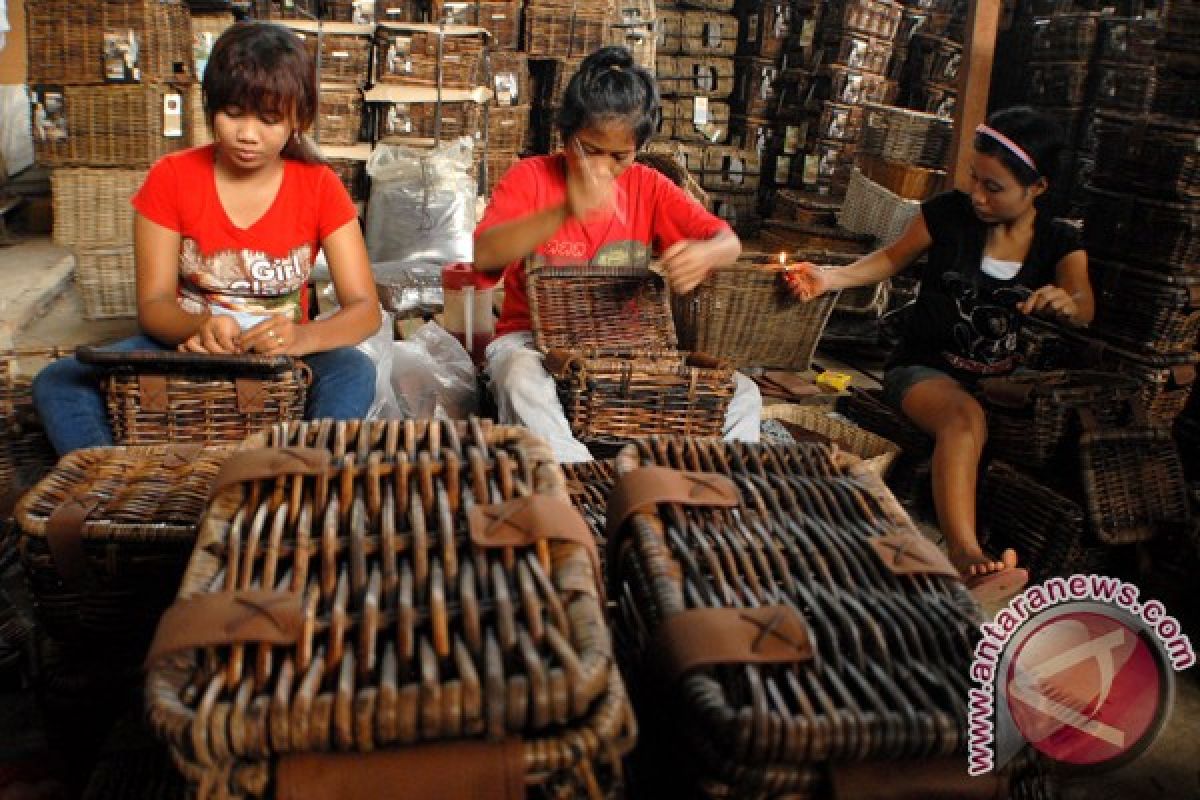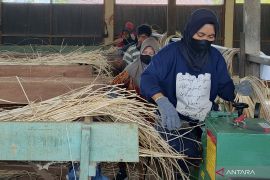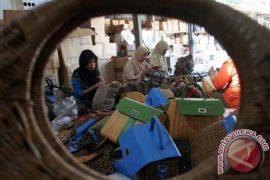"Our target is to capture the first rank, which is still occupied by China."Jakarta (ANTARA News) - The government decision to ban raw rattan exports has only served to boost its sales in the form of finished goods overseas.
In the January - August 2012 period, exports of finished goods rose from about 15 to 31 percent.
"The trade minister`s decree No. 35/2011 has shown a positive impact on Indonesia`s rattan-based product exports," Dody Edward, the director for export product and creative economy development of the trade ministry, said last week.
He added that the trade minister`s decree banning the export of raw rattan had raised the volume of rattan-made products in the first half of 2012, as compared to figures from the same period in 2011.
According to the Indonesian Rattan Handicraft and Furniture Industry Association (Asmindo), Indonesia`s exports of rattan-based products in the January-August 2012 period rose 25.2 percent from US$113.6 million in the same period in 2011 to US$142.3 million.
Dody said, with the minister`s decree Indonesia no longer exported raw rattan, but only as finished goods. This has only helped Indonesia nurture its human resources for the production of rattan-based products, such as handicraft and furniture, enabling a high quality of exports.
"If we talk about the market, we also have to talk about technological know-how and good human resources. We already have good human resources," Dody said.
He said that although Indonesia`s rattan exports were still below those of China, it will hopefully vault into first place in the future.
"Our target is to capture the first rank, which is still occupied by China. We have reliable rattan craftsmen, particularly those in Cirebon, West Java," said Edward.
This has led Asmindo chairman Ambar Tjahyono to predict that Indonesia`s rattan and wooden industries would grow by 10 percent this year. However, he added that the economic crisis in Europe could affect Indonesia`s rattan exports to that region.
"The US and European economies are predicted to be in a bad state in the next two years and that would cause wooden and rattan furniture industrialists to be in some trouble. So, to overcome this obstacle, the government should provide assistance," Ambar Tjahyono said.
According to him, the best growth the country`s rattan-based industry could hope for in this scenario is 10 percent this year and the turnover it could hope for is, at best, US$200 million.
Meanwhile, the rattan furniture industry could yet face an obstacle in the form of inadequate supplies, according to Ambar, who has since last year voiced the need to establish a rattan buffer stock agency to help store rattan stocks.
oreover, a buffer stock could help farmers accommodate their rattan stocks, while industries could be provided with enough raw material supplies from the stocks.
"Rattan furniture industries are facing difficulties in finding raw materials. Raw rattan exports are not allowed, so rattan collectors only gather rattan based on demand at home. This causes the industry to lack raw rattan," Ambar Tjahyono noted not long ago.
A senior trade official said on Wednesday that the idea to form a buffer stock by a number of rattan stakeholders needed to be considered in order to overcome the problem of raw material stocks.
"We need to study carefully the proposal to form a buffer stock and whether or not it would be advantageous for farmers, collectors, producers and customers," Director for National Export Development Gumardi Gustami said.
When the government allowed the exports of raw rattan, rattan industries at home complained of a shortage of raw materials, but since the banning of the exports of raw rattan, farmers and collectors complained of surplus stock which could not be absorbed by industries at home.
Therefore, a buffer stock, similar in character to that of the state logistics board (Bulog) which collects rice, is needed to accommodate farmers` raw rattan and to ensure an adequate supply of stocks for rattan-based manufacturing industries.
Gusmardi said that in the trade minister`s decree No. 35/2011 on banning raw rattan exports, matters relating to buffer stock were not regulated.
He claimed, however, that the ban on raw rattan exports had brought benefits to rattan industries at home as indicated by the increase in their rattan-based product exports. In the period of January - June 2012, Indonesia`s rattan furniture exports had reached US$97 million, an increase of 15 to 16 percent compared to figures from the same period in 2011.
However, industry voices paint a different picture. Exports declined in August 2012 when compared with figures from the previous month. "The European and United States' economic conditions have a big influence on Indonesia`s furniture exports," Ambar said during a post-fasting month get-together last week.
Asmindo data showed that Indonesia`s rattan exports in 2010 were valued at US$137.9 million, up by 9.6 percent when compared with those in 2009. However, figures dropped by 17.6 percent to US$113.6 million in 2011 due to the global economic crisis.
In August this year, the country`s rattan exports dropped to 11.20 million dollars from 16.23 million dollars in July. According to Asmindo, apart from the global crisis, the drop in Indonesia`s exports of rattan products was also caused by the banning of raw rattan exports.
"The export ban has no direct beneficial impact on the industry, but adversely it continued to decrease exports," Ambar said.
Asmindo said last year that before the ban on raw rattan exports was introduced, rattan exports could reach 3,000 containers per month.
But following the decree, it dropped to only 700 containers per month.
He predicted that with the uncertain global economic conditions, exports in 2012 could be pegged at best at US$180 million only.
"If in 2011, the export target set at 160 million dollars was achieved, it would be a good thing if we could increase it this year by 11 percent," he said.
He expressed hope that Indonesia could diversify its export destinations from Europe and the United States to China, India, South Korea, Taiwan, the Middle East and Latin American countries.
(T.A014/INE/KR-BSR/F001)
Reporter: by Andi Abdussalam
Editor: Priyambodo RH
Copyright © ANTARA 2012










